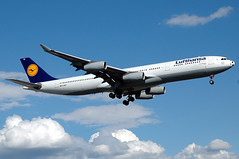Three Wonderful Wonderings

Sometimes questions pop into my head and I don't have sufficient time, bandwidth, or motivation to search for the answers. A lucky few of these questions get written down on a piece of paper, and only a subset of those ever get investigated. But today, I've taken the time to answer some of my own questions, and I will now share them with you.
1) Why is cinema called the "seventh art"?
When Paul Newman died a couple months ago, the Spanish newscasters kept using the phrase "seventh art". The world of the seventh art is in mourning today following news of..., He was a master of the seventh art..., etc. After about the thirtieth time they used it, my thick little noggin had enough context to understand that "cinema is the seventh art". Which leads to the obvious questions: What are the first six? Are there more?
 It turns out to be a tradition left over from ancient Greece. The Greeks loved classifying things. They defined a dichotomy between "superior arts" and "inferior arts", where the former involved the "superior senses" of vision and hearing. There were six superior arts:
It turns out to be a tradition left over from ancient Greece. The Greeks loved classifying things. They defined a dichotomy between "superior arts" and "inferior arts", where the former involved the "superior senses" of vision and hearing. There were six superior arts:
- Architecture
- Sculpture
- Painting
- Music
- Literature
- Dance and Theater
The first reference to cinema as the seventh art was in 1911 by a chap named Ricciotto Canudo, who was more or less the first "film theoretician", whatever that is. And there you have it, cinema is the seventh art!
Some additional searching has found other arts added to the list.
- Cinema
- Television
- Comics
- Videogames
I hereby decree that blogging is the eleventh art.
2) What is an air mile? And why do they use them in countries that use the metric system?
 On the way back from our last trip abroad, in the Frankfurt airport, a Lufthansa representative asked me if I was in the Lufthansa frequent flier program and collected "miles". I said no. As I walked to the gate, I figured out what had struck me as odd about that encounter. I wondered aloud, "We're in Europe now. With the exception of the UK, they don't measure anything in miles in Europe. It seems like Lufthansa frequent fliers should be collecting 'Air Kilometers' instead!" Marga knew the answer. "This is the aeronautics industry," she said, "They measure everything in nautical miles." Indeed! So you have to go 1.15 miles to get 1 "air mile" on your frequent flier account.
On the way back from our last trip abroad, in the Frankfurt airport, a Lufthansa representative asked me if I was in the Lufthansa frequent flier program and collected "miles". I said no. As I walked to the gate, I figured out what had struck me as odd about that encounter. I wondered aloud, "We're in Europe now. With the exception of the UK, they don't measure anything in miles in Europe. It seems like Lufthansa frequent fliers should be collecting 'Air Kilometers' instead!" Marga knew the answer. "This is the aeronautics industry," she said, "They measure everything in nautical miles." Indeed! So you have to go 1.15 miles to get 1 "air mile" on your frequent flier account.
3) Do all birds lay unfertilized eggs like chickens do?
 Recently I was eating some arroz a la cubana and Marga and I were discussing what a perfect food fried chicken eggs are: full of nutrients, quick and easy to cook, no seasoning required, delicious, etc. Between shoveling pieces of yolk-soaked bread into my mouth, I wondered aloud how unique chickens were in laying such lovely, but useless (to them), unfertilized eggs. WikiAnswers to the rescue!
Recently I was eating some arroz a la cubana and Marga and I were discussing what a perfect food fried chicken eggs are: full of nutrients, quick and easy to cook, no seasoning required, delicious, etc. Between shoveling pieces of yolk-soaked bread into my mouth, I wondered aloud how unique chickens were in laying such lovely, but useless (to them), unfertilized eggs. WikiAnswers to the rescue!
Q: Do wild birds lay unfertilized eggs? A: The answer is yes - all birds have the ability to lay unfertilized eggs, however in the wild this is a rare occurrence due to the drive to mate.
The laying of unfertilized eggs is simply a method of disposing of the unused egg from the body of the bird.
The domesticated chicken and duck are unusual amongst birds due to the fact that they will lay an egg almost daily. This useful feature has been selectively bred into the domesticated species for hundreds of years, and is also partially due to the fact that their eggs are removed daily.
If a chicken or duck is left with their eggs, they will start to brood, stop laying eggs and try to hatch the eggs they already have.
And there you have it. Three blog posts in one! I'm like the Paul Newman of the eleventh art.